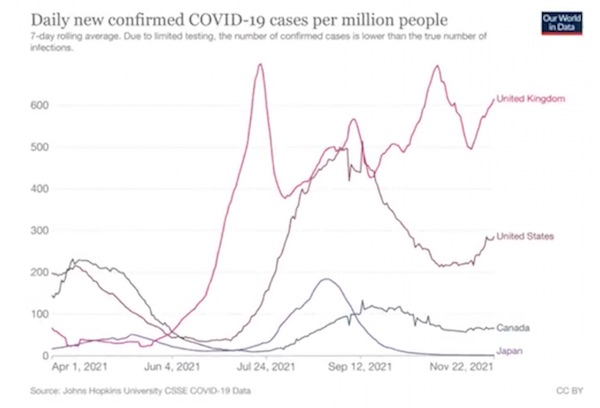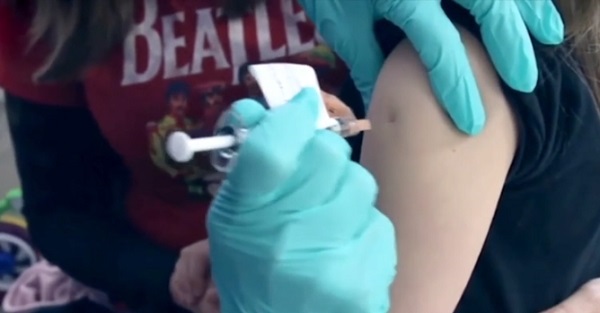COVID-19
The possible explanations for Japan’s Covid-19 miracle

Dr. John Campbell examines the situation in Japan where Covid-19 cases have plummeted and remain at among the lowest rates in the world.
As the opening day of the Olympics approached this summer, Japan, as host country was seeing a surge of covid-19 cases. Unfortunately the summer festival was highly locked down to visitors and fans were not allowed to attend the competitions. That surge in cases turned out to be the worst wave Japan has faced since the beginning of the pandemic.
On August 13, the Chairman of the Tokyo Medical Association announced that Ivermectin would be allowed as a treatment. Within 2 weeks, skyrocketing case numbers started to fall at the same rate they were going up just days earlier. The number of new cases bottomed out and have remained incredibly low. In this video Dr. John Campbell looks at Ivermectin and other possible explanations for Japan’s incredible success.
Here are the notes Dr. Campell makes in this video:
Ivermectin allowed as a treatment on August 13: Doctors can prescribe without restrictions. People can buy it legally from India
Dr. Haruo Ozaki, Chairman of the Tokyo Medical Association https://www.tokyo-np.co.jp/article/12…
It is necessary to thoroughly study the clinical trial, but it seems that we are at the stage where it is okay to have the patient give an informed outlet and get permission to use it. https://www.japantimes.co.jp/news/202…
Viral genetic mutations Ituro Inoue, professor, National Institute of Genetics. Delta variant in Japan accumulated too many mutations. Virus’s error-correcting protein, nsp14. Majority of nsp14 specimens in Japan seemed to have undergone many genetic changes in mutation sites called A394V.
More people in Asia have a defense enzyme called APOBEC3A that attacks RNA viruses, Including the SARS-CoV-2 virus that causes COVID-19, when compared to people in Europe and Africa.
National Institute of Genetics and Niigata University Research to discover how the APOBEC3A protein affects the nsp14 protein A394V discovered in 24 other countries SARS ended abruptly in 2003
Working on a drug to inhibit nsp14
COVID-19
Judge denies Canadian gov’t request to take away Freedom Convoy leader’s truck

From LifeSiteNews
A judge ruled that the Ontario Court of Justice is already ‘satisfied’ with Chris Barber’s sentence and taking away his very livelihood would be ‘disproportionate.’
A Canadian judge has dismissed a demand from Canadian government lawyers to seize Freedom Convoy leader Chris Barber’s “Big Red” semi-truck.
On Friday, Ontario Court of Justice Judge Heather Perkins-McVey denied the Crown’s application seeking to forfeit Barber’s truck.
She ruled that the court is already “satisfied” with Barber’s sentence and taking away his very livelihood would be “disproportionate.”
“This truck is my livelihood,” said Barber in a press release sent to LifeSiteNews.
“Trying to permanently seize it for peacefully protesting was wrong, and I’m relieved the court refused to allow that to happen,” he added.
Criminal defense lawyer Marwa Racha Younes was welcoming of the ruling as well, stating, “We find it was the right decision in the circumstances and are happy with the outcome.”
John Carpay, president of the Justice Centre for Constitutional Freedoms (JCCF), said the decision is “good news for all Canadians who cherish their Charter freedom to assemble peacefully.”
READ: Freedom Convoy protester appeals after judge dismissed challenge to frozen bank accounts
“Asset forfeiture is an extraordinary power, and it must not be used to punish Canadians for participating in peaceful protest,” he added in the press release.
As reported recently by LifeSiteNews, the Canadian government claimed that Barber’s truck is an “offence-related property” relating to his involvement in the 2022 protests against Canada’s COVID mandates.
At this time, the court ruling ends any forfeiture proceedings for the time being, however Barber will continue to try and appeal his criminal conviction and house arrest sentence.
Barber’s truck, a 2004 Kenworth long-haul he uses for business, was a focal point in the 2022 protests. He drove it to Ottawa, where it was parked for an extended period of time, but he complied when officials asked him to move it.
On October 7, 2025, after a long trial, Ontario Court Justice Perkins-McVey sentenced Barber and Tamara Lich, the other Freedom Convoy leader, to 18 months’ house arrest. They had been declared guilty of mischief for their roles as leaders of the 2022 protest against COVID mandates, and as social media influencers.
Lich and Barber have filed appeals of their own against their house arrest sentences, arguing that the trial judge did not correctly apply the law on their mischief charges.
Government lawyers for the Crown have filed an appeal of the acquittals of Lich and Barber on intimidation charges.
The pair’s convictions came after a nearly two-year trial despite the nonviolent nature of the popular movement.
COVID-19
Freedom Convoy protester appeals after judge dismissed challenge to frozen bank accounts

From LifeSiteNews
Protestor Evan Blackman’s legal team argues Trudeau’s Emergencies Act-based bank account freezes were punitive state action tied directly to protest participation.
A Freedom Convoy protester whose bank accounts were frozen by the Canadian government says a judge erred after his ruling did not consider the fact that the funds were frozen under the Emergencies Act, as grounds for a stay of proceedings.
In a press release sent out earlier this week, the Justice Centre for Constitutional Freedoms (JCCF) said that Freedom Convoy protestor Evan Blackman will challenge a court ruling in his criminal case via an appeal with the Ontario Superior Court of Justice.
“This case raises serious questions about how peaceful protest is treated in Canada and about the lasting consequences of the federal government’s unlawful use of the Emergencies Act,” noted constitutional lawyer Chris Fleury. “The freezing of protestors’ bank accounts was part of a coordinated effort to suppress dissent, and courts ought to be willing to scrutinize that conduct.”
Blackman was arrested on February 18, 2022, during the police crackdown on Freedom Convoy protests against COVID restrictions, which was authorized by the Emergencies Act (EA). The EA was put in place by former Prime Minister Justin Trudeau’s Liberal government, which claimed the protests were violent, despite no evidence that this was the case.
Blackman’s three bank accounts with TD Bank were frozen due to his participation in the Freedom Convoy, following a directive ordered by Trudeau.
As reported by LifeSiteNews, in November of this year, Blackman was convicted at his retrial even though he had been acquitted at his original trial. In 2023, Blackman’s “mischief” and “obstructing police” charges were dismissed by a judge due to lack of evidence and the “poor memory of a cop regarding key details of the alleged criminal offences.”
His retrial resulted in Blackman getting a conditional discharge along with 12 months’ probation and 122 hours of community service, along with a $200 victim fine surcharge.
After this, Blackman’s application for a stay of proceedings was dismissed by the court. He had hoped to have his stay of proceedings, under section 24(1) of the Charter of Rights and Freedoms, allowed. However, the judge ruled that the freezing of his bank accounts was legally not related to his arrest, and because of this, the stay of proceedings lacked standing.
The JCCF disagreed with this ruling, noting, it “stands in contrast to a Federal Court decision finding that the government’s invocation of the Emergencies Act was unreasonable and violated Canadians’ Charter rights, including those targeted by the financial measures used against Freedom Convoy protestors.”
As of press time, a hearing date has not been scheduled.
In 2024, Federal Court Justice Richard Mosley ruled that Trudeau was “not justified” in invoking the Emergencies Act.
In early 2022, the Freedom Convoy saw thousands of Canadians from coast to coast come to Ottawa to demand an end to COVID mandates in all forms. Despite the peaceful nature of the protest, Trudeau’s federal government enacted the EA in mid-February.
After the protesters were cleared out, which was achieved through the freezing of bank accounts of those involved without a court order as well as the physical removal and arrest of demonstrators, Trudeau revoked the EA on February 23, 2022.
-

 Censorship Industrial Complex5 hours ago
Censorship Industrial Complex5 hours agoUS Under Secretary of State Slams UK and EU Over Online Speech Regulation, Announces Release of Files on Past Censorship Efforts
-

 Business8 hours ago
Business8 hours ago“Magnitude cannot be overstated”: Minnesota aid scam may reach $9 billion
-

 Alberta1 day ago
Alberta1 day agoAlberta project would be “the biggest carbon capture and storage project in the world”
-

 Energy1 day ago
Energy1 day agoNew Poll Shows Ontarians See Oil & Gas as Key to Jobs, Economy, and Trade
-

 Daily Caller21 hours ago
Daily Caller21 hours agoIs Ukraine Peace Deal Doomed Before Zelenskyy And Trump Even Meet At Mar-A-Lago?
-

 Alberta2 days ago
Alberta2 days agoAlberta Next Panel calls for less Ottawa—and it could pay off
-

 Energy2 days ago
Energy2 days agoWhile Western Nations Cling to Energy Transition, Pragmatic Nations Produce Energy and Wealth
-

 Business7 hours ago
Business7 hours agoLargest fraud in US history? Independent Journalist visits numerous daycare centres with no children, revealing massive scam









